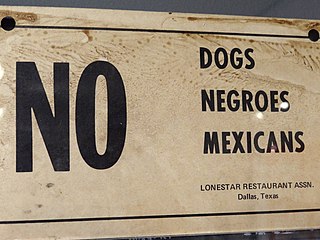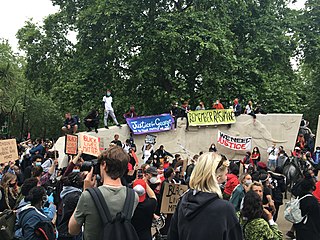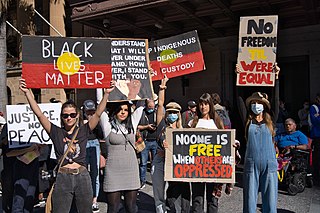| Strike for Black Lives | |
|---|---|
| Part of George Floyd protests, Black Lives Matter, and Fight for $15 | |
| Date | July 20, 2020 |
| Location | |
| Methods | Walkout |
The Strike for Black Lives was a mass walkout that occurred throughout the United States on July 20, 2020. Occurring during the George Floyd protests, the main goals of the strike were to draw attention to systemic racism and racial inequality in the United States, with additional goals including a raising of the minimum wage in the United States, stronger protections for unionizing, and expanded healthcare.
Following the murder of George Floyd by Minneapolis police officer Derek Chauvin on May 25, 2020, a series of protests occurred, initially in the Twin Cities area, but quickly spreading across the United States and worldwide. [1] As part of the wider Black Lives Matter movement, the protests are rooted in longstanding racial issues in the United States, such as police brutality, institutionalized racism, and racial discrimination. [1] The idea for a mass strike was announced on Twitter on July 8 with the hashtag #StrikeForBlackLives. [2] Over 60 groups helped to organize the event and included such groups as the International Brotherhood of Teamsters, the American Federation of Teachers, and the United Farm Workers. [3] [4] The Movement for Black Lives, a coalition of 150 independent Black Lives Matter groups, was also involved in the organization of the strike. [2] President Mary Kay Henry of the Service Employees International Union (which was involved in the strike) stated that the strike was an effort to unite essential workers in the fight for both racial and economic justice. [4] The Associated Press compared the strike to the Memphis sanitation strike, which was also caused by both racial and economic issues. [5] According to organizers, the four main points of the strike were:
"Justice for Black communities, that elected officials use their authority to rewrite the rules so that Black people can thrive, that corporations dismantle racism, white supremacy and economic exploitation including at work and that every worker has the opportunity to join a union." [4]
The strike took place during the COVID-19 pandemic, [4] with African Americans making up a disproportionate percentage of workers impacted by the pandemic and constituting approximately 1 in 4 deaths due to COVID-19. [6]
On July 20, the strike took place in 160 American cities at multiple places of employment. [7] Workers from McDonald's and Walmart locations represented a significant portion of the strikers involved. [2] At noon, many strikers kneeled or took a moment of silence for eight minutes 46 seconds in memory of Floyd. [8] In Ferguson, Missouri, protesters marched to a memorial for Michael Brown, who was killed by police in 2014. [8] In New York City, Senate Minority Leader Chuck Schumer spoke to a crowd of protesters outside of Trump International Hotel and Tower. [4] Protesters there called for the Senate to pass the HEROES Act. [9] In Chicago, protesters met at the James R. Thompson Center and marched to a nearby McDonald's. In Detroit, a mass work stoppage occurred at several nursing homes in the area, [10] and a Fight for $15 protest was held at the same time as the strike. [3] Protesters in Durham, North Carolina, painted a "BLACK LIVES MATTER" street mural at an intersection in downtown. [11] Multiple politicians from the Democratic Party expressed support for the strike, including Senators Kamala Harris, Bernie Sanders, and Elizabeth Warren. [4]

Black–brown unity, variations include black-brown-unity[4][5] and black-brown-red unity,[6] is a racial-political ideology which initially developed among black scholars, writers, and activists who pushed for global activist associations between black people and brown people ,and Indigenous peoples of the Americas to unify against white supremacy, colonialism, capitalism, and, in some cases, European conceptualizations of masculinity, which were recognized as interrelated in maintaining white racial privilege and power over people of color globally.[7][8]

Black Lives Matter (BLM) is a decentralized political and social movement that aims to highlight racism, discrimination, and racial inequality experienced by black people and to promote anti-racism. Its primary concerns are police brutality and racially motivated violence against black people. The movement began in response to the killings of Trayvon Martin, Michael Brown, Eric Garner, and Rekia Boyd, among others. BLM and its related organizations typically advocate for various policy changes related to black liberation and criminal justice reform. While there are specific organizations that label themselves "Black Lives Matter", such as the Black Lives Matter Global Network Foundation, the overall movement is a decentralized network with no formal hierarchy. As of 2021, there are about 40 chapters in the United States and Canada. The slogan "Black Lives Matter" itself has not been trademarked by any group.
The Movement for Black Lives (M4BL) is a coalition of more than 50 groups representing the interests of Black communities across the United States. Members include the Black Lives Matter Network, the National Conference of Black Lawyers, and the Ella Baker Center for Human Rights. They are endorsed by groups such as Color of Change, Race Forward, Brooklyn Movement Center, PolicyLink, Million Women March Cleveland, and ONE DC, and the coalition receives communications and tactical support from an organization named Blackbird.

Strikes occurred during the COVID-19 pandemic due to many factors including: hazard pay or low pay, unsafe working conditions, inability to pay rent. These strikes are separate from the various protests that occurred over responses to the pandemic.

The George Floyd protests were a series of protests and demonstrations against police brutality that began in Minneapolis in the United States on May 26, 2020. The protests and civil unrest began in Minneapolis as reactions to the murder of George Floyd, a 46-year-old unarmed African American man, by city police during an arrest. They spread nationally and internationally. Veteran officer Derek Chauvin was recorded as kneeling on Floyd's neck for 9 minutes and 29 seconds; Floyd complained of not being able to breathe, but three other officers looked on and prevented passersby from intervening. Chauvin and the other three officers involved were later arrested. In April 2021, Chauvin was found guilty of second-degree murder, third-degree murder, and second-degree manslaughter. In June 2021, Chauvin was sentenced to 22+1⁄2 years in prison.

This is a list of George Floyd protests in the U.S. state of Oregon.
This is a list of protests in New York following the murder of George Floyd in 2020.
This is a list of George Floyd protests in Alaska, United States. Protests occurred in at least thirteen various communities in the state.
This is a list of protests brought on by the murders of Breonna Taylor and George Floyd in Kentucky, United States. In 2020, there were protests throughout Kentucky in reaction to the shooting of Breonna Taylor and murder of George Floyd by police, as well as the shooting of David McAtee by the Kentucky Army National Guard. The demonstrations happened regularly in the largest cities in Kentucky, including Louisville and Lexington. Many of the smaller cities had protests on at least one day.
Individuals and organizations throughout the United States and the world responded to the murder of George Floyd and the subsequent protests and riots.

Protests were held across the United Kingdom following the murder of George Floyd, a 46-year-old African-American man, by a police officer in the United States on 25 May 2020. Immediately following his murder, protests and riots occurred in dozens of cities across the United States. Protests were staged internationally for the first time on 28 May, with a solidarity demonstration outside the United States Embassy in London. They took place during the UK COVID-19 pandemic.

Shortly after protests seeking justice for George Floyd, an African-American who was accidentally killed during a police arrest, began in the United States, people in Canada protested to show solidarity with Americans and to demonstrate against issues with police or racism in Canada. Vigils and protests of up to thousands of participants took place in all 10 provinces and all 3 territories of Canada.
Shortly after protests seeking justice for George Floyd, an African-American who was murdered during a police arrest, began in the United States, people in New Zealand protested to show support for similar protests in the United States and to demonstrate against perceived issues with police brutality and structural discrimination in New Zealand. Vigils and protests of thousands of participants took place in June 2020 throughout the nation.

Shortly after protests began in the United States in late May 2020 seeking justice for George Floyd, an African-American who was murdered during an arrest by Minneapolis police, people in Australia protested to show solidarity with Americans and the Black Lives Matter movement, as well as to demonstrate against issues with police brutality and institutional racism, racism in Australia, and Aboriginal deaths in custody. Vigils and protests of thousands of participants took place nationwide.

Shortly after protests seeking justice for George Floyd, an African American who was murdered during a police arrest, began in the United States, the people of Italy also began to protest to show solidarity with the Americans.

A wave of civil unrest in the United States, initially triggered by the murder of George Floyd during his arrest by Minneapolis police officers on May 25, 2020, led to protests and riots against systemic racism in the United States, including police brutality and other forms of violence. Since the initial national wave and peak ended towards the end of 2020, numerous other incidents of police violence have drawn continued attention and lower intensity unrest in various parts of the country.
On August 26, 2020, some professional athletes in the United States began to go on strike for their respective sports contests in response to the police shooting of Jacob Blake in Kenosha, Wisconsin. After the video of Blake's shooting in which he was seriously injured went viral, protests and riots broke out in the city of Kenosha and elsewhere. As a result of the shooting of Blake and the protests which followed, on August 26, professional athletes refused to play in their scheduled sports events, beginning with the Milwaukee Bucks of the National Basketball Association (NBA).

Many artworks related to the Black Lives Matter movement were created in Portland, Oregon, United States, during local protests over the murder of George Floyd and other Black Americans. Oregon Arts Watch contextualized the artistic works, stating that a "whitewashed pre-COVID lens" on American life, which obscured systemic racism, had been "cracked", and describing artists' response to racial violence being brought into the public eye was a "marathon, not a sprint".